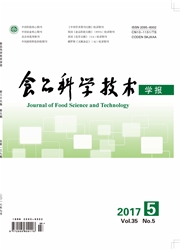

 中文摘要:
中文摘要:
以鲢鱼鱼肉为原料,研究了超声波、微波、加热处理对鲢鱼鱼肉蛋白溶解性的影响.结果表明:蛋白的乳化性及乳化稳定性随加热温度的升高、微波和超声功率的增大及时间的延长均呈现先增大后减小的趋势.与室温下的蛋白相比,35℃加热9 min时的蛋白乳化性提高了36.79%,乳化稳定性在7 min、35℃时提高了14.2%;与未经微波处理的蛋白相比,微波功率100 W、40s时,乳化性提高了1.35倍,乳化稳定性在100 W、30 s时提高了15.85%;与未经超声处理的蛋白相比,乳化性在超声功率160 W,超声时间10 min时提高了56.7%,乳化稳定性在200 W、15 min时提高了9.85%.
 英文摘要:
英文摘要:
Effects of thermal, microwave, and ultrasonic treatments on emulsification of silver carp protein were studied with silver carp as raw material. The results indicated that its emulsifying activity and emulsifying stability increased firstly and then showed a decreasing trend with the increase of the heating temperature, microwave, and ultrasonic power. Compared with the protein at room temperature, the emulsifying activity of protein increased by 36.79% at 35 ℃ for 9 min, and the emulsifying stability increased by 14.2% at 35 ℃ for 7 min. Compared with the protein untreated by microwave, the emulsifying activity of protein treated by 100 W microwave for 40 s increased by 1.35 times, and the emulsifying stability of protein treated by 100 W microwave for 30 s increased by 15.85%. Compared with the protein untreated by ultrasound, the emulsifying activity of protein treated by 160 W ultrasound for 10 rain increased by 56.7% , and the emulsifying stability of protein treated by 200 W ultrasound for 15 min increased by 9.85%.
 同期刊论文项目
同期刊论文项目
 同项目期刊论文
同项目期刊论文
 期刊信息
期刊信息
